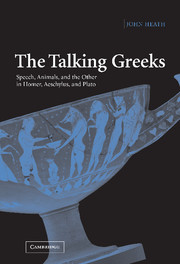Book contents
- Frontmatter
- Contents
- Preface and acknowledgments
- Introduction
- Part I SPEECH, ANIMALS, AND HUMAN STATUS IN HOMER
- Part II LISTENING FOR THE OTHER IN CLASSICAL GREECE
- Chapter 4 Making a difference: The silence of Otherness
- Part III SPEECH, ANIMALS, AND HUMAN STATUS IN CLASSICAL ATHENS
- Epilogue
- Bibliography
- Index
Chapter 4 - Making a difference: The silence of Otherness
Published online by Cambridge University Press: 22 September 2009
- Frontmatter
- Contents
- Preface and acknowledgments
- Introduction
- Part I SPEECH, ANIMALS, AND HUMAN STATUS IN HOMER
- Part II LISTENING FOR THE OTHER IN CLASSICAL GREECE
- Chapter 4 Making a difference: The silence of Otherness
- Part III SPEECH, ANIMALS, AND HUMAN STATUS IN CLASSICAL ATHENS
- Epilogue
- Bibliography
- Index
Summary
In Part One I argued that in our earliest evidence for Greek thinking about the nature of man, the ability to speak is what makes us human. Oral mastery and control of language are the essential features that define humanity. This linguistic differentiation is literal in the case of animals – they don't talk and we do. This simple fact of nature is then used metaphorically to distinguish other categories of human status: men and women, humans and gods, the living and the dead, Greek and non-Greek, the young and the old, the heroic and the rest of us.
In Part Three we will take a close look at two classical authors for further reflections upon the connection of bestial silence with human speech and status. But first we need to make a more general survey of what happens to this connection in Greece after Homer. We will find that the basic differentiations uncovered in the epics are not entirely invented in the classical period, but are more carefully and systematically applied, especially in Athens. This review will necessarily lead us through some familiar terrain. Although the Other may have been muzzled in classical antiquity, recent scholarship on the topic certainly has not been. My analysis differs from most previous studies, however, in its two primary theses:
Control of speech is central to all Greek hierarchical thought about status;
This emphasis on speech as the primary criterion of differentiation between groups supplied the very tool by which the status of “muted” members has been so drastically improved in modern Western culture.
- Type
- Chapter
- Information
- The Talking GreeksSpeech, Animals, and the Other in Homer, Aeschylus, and Plato, pp. 171 - 212Publisher: Cambridge University PressPrint publication year: 2005

